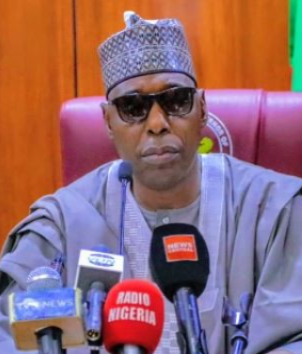
Borno State Governor, Prof. Babagana Zulum, has announced an ongoing review of counter-insurgency strategies in collaboration with the Federal Government, in response to the recent resurgence of attacks across parts of the state.
Speaking in a statewide broadcast on Saturday, Zulum reaffirmed his administration’s commitment to bolstering local security architecture, improving intelligence gathering, and providing frontline security personnel with the tools they need to combat insurgency effectively.
“In recent months, I have held extensive consultations with our federal partners and the leadership of various security agencies,” the governor said. “I am pleased to inform you that the collaboration between Borno State and the Federal Government is stronger than ever. Together, we are working on comprehensive strategies to strengthen our security architecture, enhance intelligence sharing, and equip our security agents with the necessary tools to confront the threats before us.”
He added that President Bola Tinubu and the Service Chiefs had given firm assurances of support to Borno in addressing its persistent security challenges.
Zulum also stressed the importance of reinforcing volunteer forces such as the Civilian Joint Task Force, local vigilantes, and hunters.
He said the government would continue to improve community-based intelligence networks and early warning systems.
“Let me warn against colluding with these armed groups, either individually or as a community. They are our collective enemy,” he cautioned.
The governor also addressed the water scarcity affecting Maiduguri and its surrounding areas, attributing the crisis to the destruction of vital infrastructure caused by last year’s catastrophic floods.
“I appeal for your patience and understanding as we finalise efforts to fully re-establish the water supply system,” he said.
Zulum announced the reconstitution of the Anti-Social Vices Committee to curb rising criminal activities in Maiduguri, including violent crimes and social disorder.
He called on citizens, traditional rulers, religious leaders, and civil society groups to support peacebuilding efforts in the state.
“We are fully aware that the road to lasting peace is not an easy one. But with unity, perseverance and faith, we shall all overcome it, Insha Allah,” he said.
As part of a spiritual response to the ongoing crisis, Governor Zulum called on Borno residents to observe a voluntary fast on Monday, May 19, seeking divine intervention for peace and stability.
“Fasting is more than a personal spiritual act; it is a communal expression of our shared hope. Through prayer and reflection, we can strengthen our unity, renew our resilience, and restore our collective purpose,” he added.
He also extended condolences to the families of military personnel who lost their lives in the line of duty and prayed for strength to bear the loss.
Meanwhile, a federal lawmaker representing Ikorodu Federal Constituency in Lagos and Chairman of the House Committee on Defence, Babajimi Benson,has called for Nigeria to allocate at least five per cent of its Gross Domestic Product annually to the defence sector.
He argued that this is essential to effectively combat the wave of killings and abductions plaguing various regions of the country.
In an exclusive interview with The PUNCH, Benson commended the efforts of Nigeria’s armed forces but insisted that increased investment is needed to prepare them adequately for the country’s multidimensional security challenges, including insurgency, terrorism, and banditry.
“Our defence sector requires a minimum of five per cent of the country’s GDP to function effectively,” he said. “Examples from countries like Turkey, Morocco, India, France, and Pakistan show the necessity of deliberate, consistent, and well-targeted spending in defence.”
He noted that despite what appears to be significant annual budgetary allocations, about 80 per cent of defence spending goes toward personnel welfare, leaving insufficient funding for capital expenditure, equipment procurement, surveillance systems, and operational logistics.
Benson also blamed the worsening insecurity on external dynamics, particularly the withdrawal of French forces from the Sahel region, which he said had emboldened jihadist groups to expand their activities, exploiting Nigeria’s porous borders.
“The activities of jihadists have been exacerbated with France’s departure from the Sahel. This is a huge challenge for our country,” he stated.
He expressed optimism about forthcoming reforms, revealing that a novel and sustainable defence funding model will soon be unveiled by the Federal Government.
“There is a silver lining which will be unveiled before the second anniversary of this administration. It will ensure that the financial power needed to procure critical assets to eradicate known security threats will be consistently provided,” he said.
Benson praised President Tinubu and Speaker Tajudeen Abbas for their commitment to security, saying the 10th House of Representatives will continue to prioritise national security through legislation, oversight, and strategic reforms.
punch






